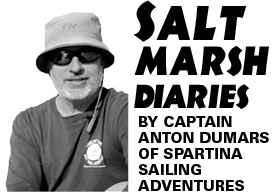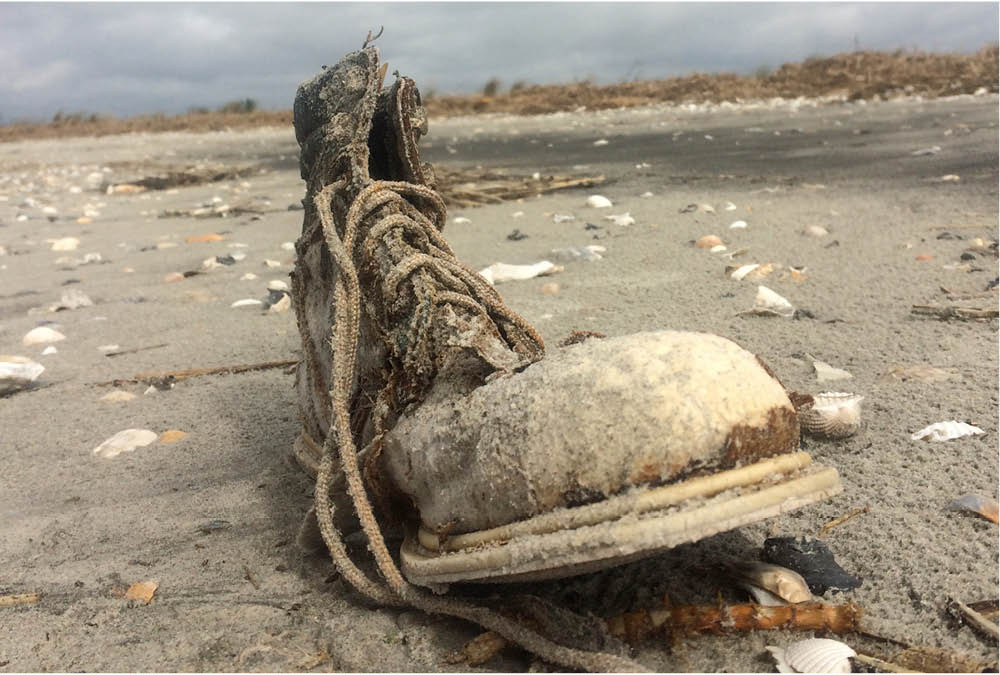Giving Plastic the Boot
Going plastic-free may be impossible, but we should try to reduce our use of it much as we can
 Every single time I walk the beach, I find plastic. I wish shark vertebra were so easy to find. I pick up plastic grocery bags, single-use water bottles, and cellophane sippy-straw wrappers. Sometimes I find a plastic milk jug, a plastic bait bag, or a gom (a shrimper’s term for big tangle of line of monofilament fishing line).
Every single time I walk the beach, I find plastic. I wish shark vertebra were so easy to find. I pick up plastic grocery bags, single-use water bottles, and cellophane sippy-straw wrappers. Sometimes I find a plastic milk jug, a plastic bait bag, or a gom (a shrimper’s term for big tangle of line of monofilament fishing line).
Capt. Phil Frandino regularly picks up beach trash during the “excursion” portion of our eco-tours. Sometimes he employs eco-conscious passengers to assist.
Plastic, pervasive globally, is made of fossil fuel. Petroleum becomes plastic. Many plastic manufacturing factories are located in Texas and Louisiana near petroleum sources.
Plastic harms the environment from start to finish. Extracting petroleum adds CO2 to the atmosphere, therefore exacerbates climate change. Massive plastic factories replace farmland and families along the Mississippi and pollutes the surrounding air and water.
Plastic waste ends up everywhere, including a Texas-size “garbage patch” in the middle of the Pacific Ocean. I’ve not mentioned harmful micro-plastics, a subject that merits several PhDs of research.
Plastic is convenient to use and cheap to manufacture … cheaper to make new plastic than to recycle old plastic. Only about 9 percent of plastic gets recycled. This includes plastic dutifully placed in the blue bins each day.
Honestly, plastic waste should be sequestered into a separate part of the landfill until someone develops a feasible use for it.
Plastic is EVERYWHERE! Ever tried to go plastic-free? It’s not easy, and, in some cases, more expensive. Bulk potatoes cost more than a plastic bag of potatoes … WHY!!
Try to buy some plastic-free laundry detergent … almost impossible. Powdered detergent is the best bet, but it still has a plastic scoop inside. About 60 percent of our clothes now contain plastic. Even some tea bags contain microplastic.
Can we go plastic-free? Probably not. Can we reduce plastic use? Yes. Buy as much as possible in bulk. Avoid pre-packaged stuff when possible. Re-use bulk containers for olives, nuts, etc.
We’re all aware of the problem, but reminders can’t hurt. Folly Beach government, plus many residents and Folly-lovers do their part without shaming others. They lead by example. We all should. Our collective future depends on it.
Capt Anton, a coastal geologist and longtime Folly resident, has not figured out how to go plastic-free, but frets about it daily. Contact Anton at sailspartina@gmail.com.


